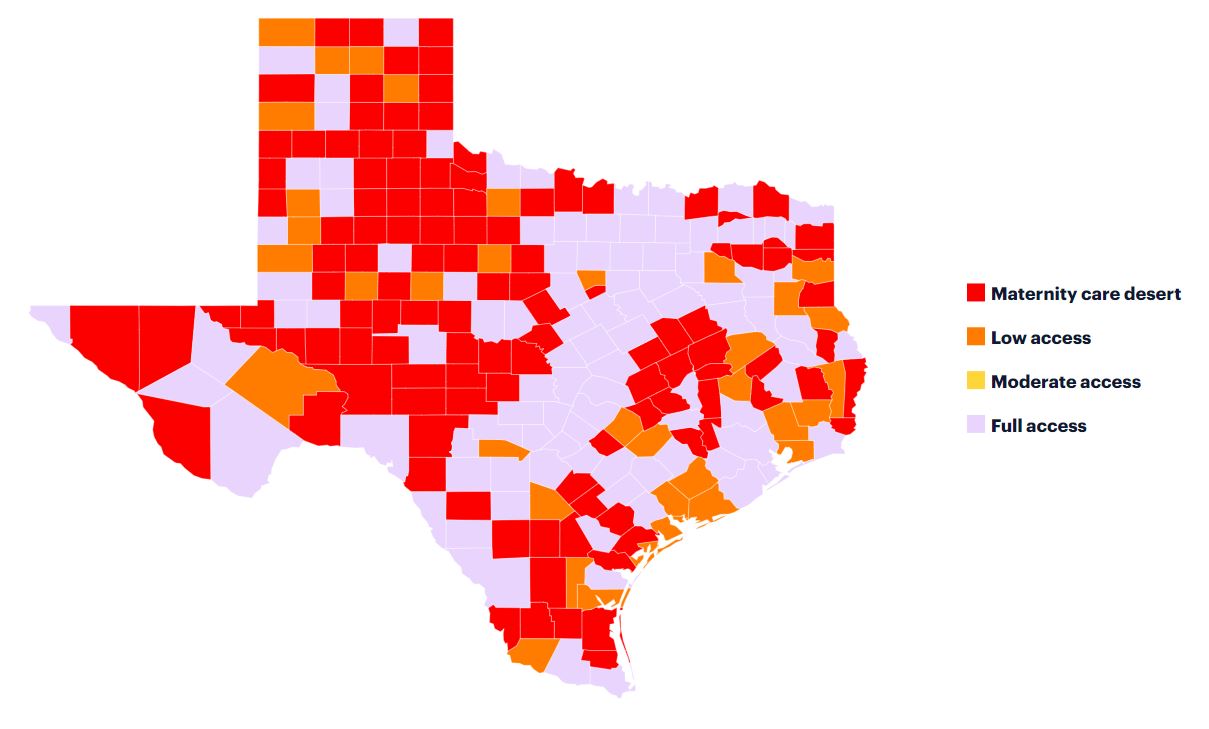
Share On Social!
Implications of the lack of quality maternal healthcare in the United States are well documented.
Pre-term birth rates are rising, maternal mental health is suffering, and maternal mortality remains high, especially in women of color.
Women living in rural areas are hit even harder by these implications, as indicated by a new March of Dimes report on maternity care deserts.
Let’s explore just how much living in a rural area matters when it comes to maternal health, and how we can work to improve maternity care in underserved rural areas.
Maternity Care Deserts in Rural Texas Counties
Maternity care deserts make up 36% of all US counties, according a 2022 March of Dimes report.
These maternity care deserts contribute to the US having the highest maternal mortality rate among developed countries, as they make it significantly harder for women to get the care they need.
In Texas, a state that earned a failing grade in maternal and infant health last year, nearly half (46.5%) of counties are considered maternity care deserts.
Many of these maternity care deserts are in rural areas, such as Ward County (57.1% Latino).
In Monahans, the county seat of Ward County, Latinas Claudia and Natalia know first-hand the reality of maternity care deserts.

“My second baby was born in the car,” Claudia told March of Dimes. “The third one was almost the same, I barely made it to the hospital.”
Now pregnant with her fifth child and faced with at least a 30-minute drive to the nearest hospital with obstetric services, Claudia is afraid history will repeat itself.
“My plan is…I actually think I’ll give birth in my car. I think I’ll put the baby on my lap and keep driving,” Claudia told March of Dimes.
Natalia is faced with similar worries. She must travel 30 to 45 minutes to get to the nearest birthing hospital in Odessa, Texas.
“During an emergency, 30 minutes is a lot of time, especially when you’re pregnant,” Natalia told March of Dimes.
These long commutes are also costly when it comes to getting regular checkups. 14.1% of Ward County’s population lives in poverty, and 23.2% of people younger than 65 are uninsured.
“We have patients that come into our area from 30 minutes to almost four hours away,” Marol Nieto, FNP-C, Texas Tech University Health Sciences Center, told March of Dimes. “We see patients from little cities like Monahans just because there’s not any prenatal care available in these small towns. And they have to drive all this way just to be able to get that prenatal care—not even just for the delivery, but for their regular checkups because there’s not an obstetric and gynecologist available in those areas.”
But Texas isn’t an anomaly.
Maternal healthcare across rural America is vanishing. In just the last year, the number of birthing hospitals decreased by 4%, according to March of Dimes.
This isn’t a new trend, either. Between 2010 and 2018, 5% of the country’s total rural hospitals shut down, leaving many women, like Claudia and Natalia, struggling to find quality maternal healthcare.
Supporting Equitable Maternal Healthcare in Rural Areas
No matter where they live, all women deserve timely access to safe and effective maternal healthcare.
March of Dimes hopes that their new report on maternity care deserts can help decision makers, public health professionals, clinicians, and researchers advocate for policies and resources that increase maternity care access in each state.
For instance, investing more in telehealth services may help.
“Telehealth, through various platforms, equips maternal health providers with the tools to better facilitate care before, during and after pregnancy and has been shown to not only increase access but also improves patient engagement and treatment,” according to March of Dimes.
See your state’s maternity desert report.
Read more about America’s maternal healthcare crisis.
You Can Help, Too
Lack of access to quality maternal healthcare is just one health inequity facing Latinas and all women. Learn more about emerging maternal mental health resources and the rising cost of childcare.
You can promote health equity for Latinas and all mothers by selecting your county and getting a Health Equity Report Card by Salud America! at UT Health San Antonio.
In your report card, you will see maps, data, and gauges to compare health equity issues, including access to healthcare, to the rest of your state and nation.
You can email your Health Equity Report Card to local leaders to stimulate community change. Use the data in your materials or share on social media to raise awareness.
Get your Health Equity Report Card!
Explore More:
Maternal & Child HealthBy The Numbers
20.7
percent
of Latino kids have obesity (compared to 11.7% of white kids)



